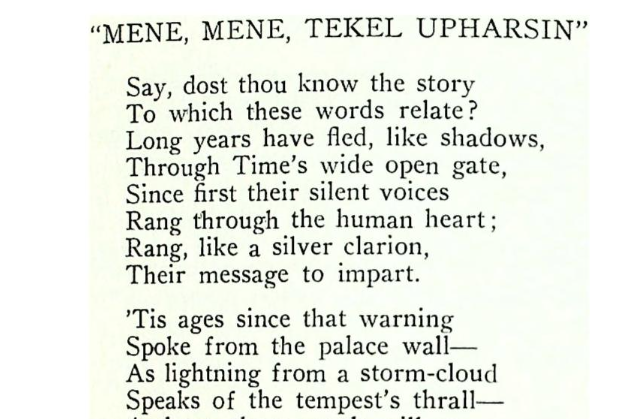| Contribute a translation | Source (English) |
|---|---|
New Year | |
The stream of Time glides ever swiftly by Now in the shade now in the sun’s bright ray, And flower-laden, hung with rosy mists, Has brought to us another New Year’s Day. | |
All rainbow-tinted floats a tiny speck Upon the tide; no fairy hand reveals What hidden lies beneath its mystic shade, How much of joy and sorrow it conceals. | |
But, as it nears, a child in raiment white, A winged form with radiant face we see, An echoing born in hand, and borne aloft To greet mankind, by Faith, Hope, Charity. | |
All eagerly we greet the fair young year, Nor heed the phantoms that with measured tread. Keep weary vigil, where the Old Year’s form Upon the farther shore, lies cold and dead. | |
He brought to each of us a flower of joy; To each he brought a sorrow and a tear; Within each heart a trace; upon each brow A kiss;—the stern, the just, the dead Old Year. | |
We part from him reluctant yet content, Sweet memories and dreams will linger near, Rut mankind, hopeful, turns to something bright, And Israel welcomes in her glad New Year. | |
How sweet his countenance, though yet ’tis dim Within the glimmer of the morning ray, But on his fair young brow a star he wears— The morning star of the Atonement Day. | |
But list! a song of joy is on his lips, A song as silv’ry as had sweet bells rung, The words, which echo o’er the stream of Time; “The God of Israel—our God is One.” | |
Till Israel hears the song and swells the strain, Which ever echoes on like one glad cheer, While to all mankind on this broad earth flows This glad refrain; A happy, bright New Year! |
The poem “New Year” by Miriam del Banco (1858-1931) was included in her posthumously published anthology, Poetry and Prose (1932), p. 113-114. The poem was likely published during her lifetime, but we do not know where or when. If you know, please leave a comment, or contact us. –Aharon Varady
Source(s)


“New Year, a poem by Miriam del Banco (1932)” is shared through the Open Siddur Project with a Creative Commons Public Domain Dedication 1.0 Universal license.










Leave a Reply